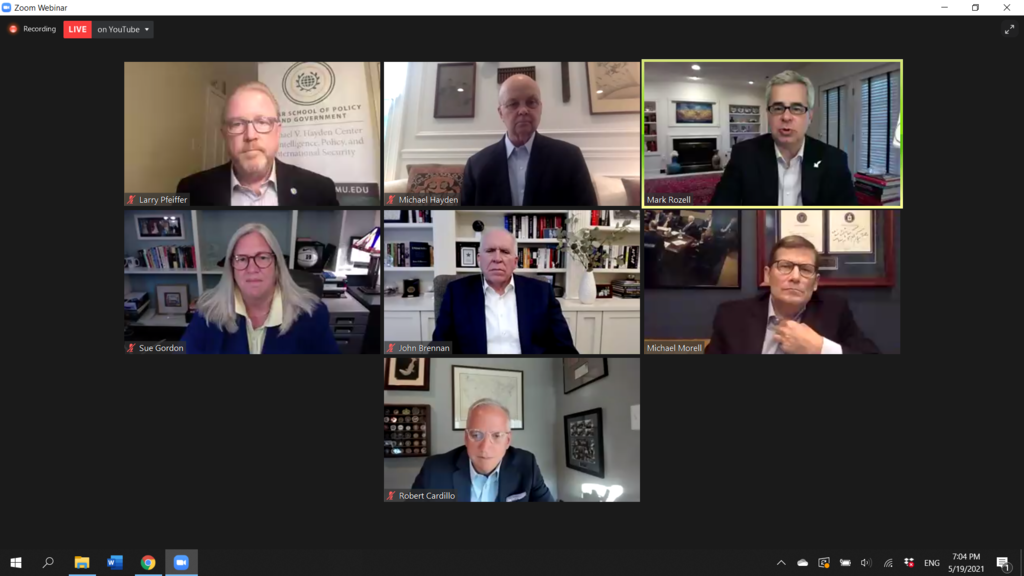In This Story
“And ye shall know the truth and the truth shall make you free.” – John VIII-XXXII
The quote inscribed on the wall of the Original Headquarters Building of the Central Intelligence Agency is memorable, given both its call to action and its irony. The Intelligence Community knows all too well that officers spend day in and day out dealing with incomplete facts, half-truths, and trying to determine what may be disinformation.
But the quote inscribed under the orders of CIA director Allen Dulles (1953-61), determined what must be done in eras receding from our memory and into an increasingly distant past. What, or who, could possibly determine the future of intelligence?
The Michael V. Hayden Center for Intelligence, Policy, and International Security at the Schar School of Policy and Government hosted an event to answer what the future of intelligence might hold, bringing lessons from the past to a present (albeit virtual) audience.
Schar School distinguished visiting professor Michael Morell, former deputy director of the CIA, hosted a 90-minute conversation with three former senior intelligence officials. Those included Susan Gordon, the former Principal Deputy Director of National Intelligence from 2017-2019 and Deputy Director of the National Geo-Spatial Intelligence Agency (NGA); Robert Cardillo, who served as Director of NGA from 2014-2019; and John Brennan, who served as Director of CIA from 2013-2017. General Michael Hayden also participated in the discussion.
More than 400 viewers tuned in from around the world. Another 250 have seen the recording on the Hayden Center’s YouTube channel.
Morell began by asking the panelists if the mission of intelligence has changed.
“My definition of the mission of intelligence is to know the truth, to see beyond the horizon, and to allow leaders to act before events dictate,” said Gordon, in concordance with the other panelists. “That is the greatest advantage we provide…knowing a little bit more, a little bit sooner, so that a leader has a running start on making a decision rather than having their hand forced by events.”
In that sense, the future of intelligence is the future itself.
Although the mission of the Intelligence Community appears stagnant, the threats to the nation are not. Morell switched his questioning to the rise of China, and what the future threats will surely be.
“I agree that China demands a very prominent, almost dominant, sort of focus as far as resource allocation and the interest of the Intelligence Community,” said Brennan. “At the same time, though, there are so many other issues, and what we don’t want to do is deprive some of these other issues of the necessary resources and capabilities.”
One of those capabilities lies in the ability to cooperate between partners within the Intelligence Community and outside of it, a capability some may have fallen short on.
“I think we’re playing catch-up now to raise our game, to work with partners in Treasury, to work with partners in the international community, and to work with private companies as well, in a way that raises insight into trade, monetary policy, international sanctions, [and more],” said Cardillo. “What I worry about going forward is that bureaucracy will not adapt and provide the agility, the time sensitivity, the innovation that I believe is demanded now of the Intelligence Community.”
The rise of China is concerning enough, but the technological boom in the last two decades will prove to be another future issue to contend with.
“The Intelligence Community does not have the technical foundation to deal with this data world,” said Gordon. “Whether it is in its infrastructure, whether in its hiring, whether it’s in its speed of motion—its ability to work with data, it doesn’t necessarily have the collectors that it needs to go after data that are going to provide the advantage we once had.”
Finally, and ultimately, the future of intelligence will rest on future generations.
“I do think it’s a technical world,” said Gordon, addressing those thinking of a career in intelligence. “Whatever you study, you need to be comfortable with technology, because so many solutions are going through that. But at the same time, I really want you to be a critical thinker.
“As technology becomes less the discriminator itself and the use of technology becomes the major advantage, people with a great behavioral science foundation, a great social science foundation, a great ability to do critical thinking—I can’t pick one discipline. I would encourage you to be a reader.”
“Whatever it is that interests you or motivates you, study it with a passion, and with an enthusiasm,” Brennan said. “Because with almost any discipline you can find a role within the Intelligence Community or national security structure. Study as best you can, and what it is that you like to do, and really, seriously, consider a future for yourself—in terms of your profession—somewhere within that U.S. government superstructure.”
General Hayden had one final piece of advice to give to those working in intelligence, both now and in the future. “Very simply, tell the truth,” he said. “Tell the truth.”
Schar School note: A generous gift from the Diana Davis Spencer Foundation provides $450,000 in new 2021-22 scholarships for master’s students enrolled in the Schar School's security studies programs, which includes intelligence.

